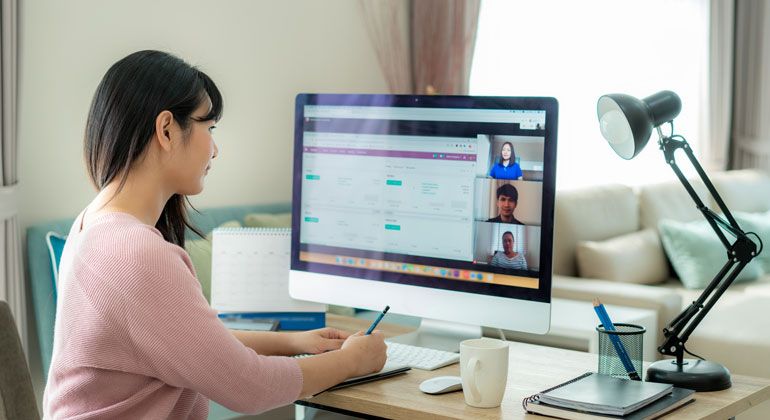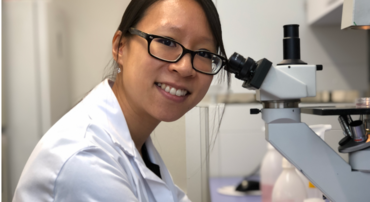The IPI's <link en services searches patent-searches-in-general assisted-searches assisted-patent-search.html>assisted patent searches and <link en services searches patent-searches-in-general assisted-searches assisted-patent-landscape-analysis.html>assisted patent landscape analyses provide SMEs, start-ups, independent inventors and researchers with an important basis to decide on the next steps to take regarding their idea or invention. During the coronavirus lockdown in April and May 2020, the Swiss Federal Institute of Intellectual Property (IPI) carried out these services free of charge via online meetings.
For IP professionals
This is the portal for professionals working in the field of intellectual property. Here you'll find direct access to all necessary resources.
Quick links
“SMEs used the lockdown period to develop new ideas”
Keeping long-distance contact with customers throughout the coronavirus crisis – the IPI supported SMEs and start-ups by carrying out free assisted patent searches online. This was a positive experience for both the customers and the IPI's patent experts. Theodor Nyfeler, Deputy Head of the Patent Division and Head of Patent and Technology Searches, gives us an insight into the initiative.

Mr Nyfeler, how was the response to the IPI’s initiative?
Theodor Nyfeler: The response was great. We received over 300 requests for assisted searches over the two months. That’s more than double the usual amount. This huge interest is also most certainly due to the wide-reaching publicity across Switzerland at the start of April, which was supported by our partners in the areas of innovation promotion and technology transfer as well as various professional associations. This allowed us to quickly reach potential users.
So smaller enterprises are staying innovative even in the current crisis?
Absolutely. It’s clear that many individuals, start-ups and SMEs have used the lockdown period to brainstorm new ideas, products and services. Our initiative encouraged them to think about protecting their ideas and inventions right from the start. That’s important. Based on the search results, they can discard ideas without potential at an early stage or they can focus on pursuing promising inventions.
What made you decide to do the initiative?
As the lockdown became apparent in large parts of the economy, it quickly became clear that we wanted to make a contribution to minimise the economic damage. Our main focus was on SMEs and start-ups that have been particularly impacted. We wanted to offer them something that would support them in the development of sustainable products and in their economic success.
How much did the initiative cost and how is the IPI financing it?
It cost us around 100,000 Swiss francs. It is financed through fee payments which the IPI receives from owners of patents, trade marks and designs. We have an official mandate to provide users with information on IP rights and the state of the art. This is what we do with the assisted searches. Even at the usual price of 300 Swiss francs, the searches do not cover costs by any means and serve to promote innovation.
Under normal circumstances, the customer comes to the IPI in Bern to do the search together with an expert. But because of the distancing rules, you had to switch to online searches. How did that go?
Thanks to the flexibility of our customers, our patent experts as well as the support of our IT department, we could provide the service practically seamlessly and with the same quality. We were somewhat sceptical at the beginning. However, although carrying out the service online is technologically challenging and involves a different way of communicating, it also has its advantages. There is less travel involved and users in outlying areas can participate more easily.
The occasional interruption of children making noise in the background has also been amusing and it creates a more relaxed atmosphere. We realised that we’re not the only ones experiencing challenges and worries. The online meetings strengthened our sense of togetherness and also somewhat helped compensate for the lack of social interaction.
Will you continue to offer the services online even if the distancing rules are lifted?
We haven’t decided that yet. There are many advantages to carrying out the joint search in person. It’s easier to interact face-to-face. For example, you can do a quick sketch to explain something or have documents to hand in paper form. There are no technical barriers or sound or video constraints. However, the online option could help to further expand the service.
Who has made use of the offer? Was there a difference compared to those who usually use the services?
The customer base hasn’t changed a lot. It’s worth noting that more private individuals used the service, perhaps to finally tackle a long-standing idea. Besides that, higher education institutes, technical schools, SMEs and start-ups used the service – and more intensively than before. The inventions examined were sometimes not as advanced as usual so there were more questions about the patenting system.
How was the customer feedback?
The customers were very satisfied and often enthusiastic about the service. They said the initiative was useful and a true support in these challenging times. The customers always appreciate having a patent expert from their field “to themselves” for four hours – and this was no different for the online service.
We know confidentiality needs to be maintained, but could you give us an idea of the search subjects? Were there inventions related to the coronavirus?
There were occasional ideas and inventions related to the current situation such as respirator masks, protective equipment and treatments for viral diseases. In addition to that, there were queries that were indirectly connected to the pandemic such as working from home and tracing technologies. However, most of them were not related to the coronavirus. They were from the same technology fields as before and were very varied, as always.
After the assisted patent search, the customer tends to know whether their invention is novel. For how many customers is this the case – that the idea is novel or potentially novel?
I don’t have an answer for that. We don’t keep statistics on it. But even if an idea or invention already exists in the same or a similar form, it can still contain important aspects which could be patented. Many draw inspiration from the documents found during the search and improve their inventions accordingly.
All of the patent experts are currently working from home. How is that going?
It’s working very well. Patent searches can be carried out entirely from the home office. When it comes to patent examination, there are still a few processes which are not paperless. These are taken care of by a small team at the IPI for their colleagues working from home. However, step by step, we are switching to electronic processes in all sectors of the IPI. Trade mark examination and registration already works in this way and electronic patent procedures will follow.
What is your prognosis for innovative companies in the near future?
Switzerland is the most innovative country in the world. The inventiveness and drive I have seen in our customers in the last few months gives me confidence that we will maintain this position and the economy will recover as a result. We are continuing to support SMEs and start-ups and are offering our assisted searches at a price of 100 instead of 300 Swiss francs until the end of the year.

Assisted searches – decision-making bases for SMEs, start-ups, inventors and researchers
Assisted patent searches and assisted patent landscape analyses involve innovators, SMEs, start-ups, independent inventors or public research institutions getting to the crux of their issue together with a patent expert from the IPI.
Assisted Patent Searches enable you to assess the patentability of your idea or invention and help you to decide on the next steps. Over 85% of assisted search customers use this service.
An Assisted Patent Landscape Analysis involves analysing a specific technology field based on companies and technology trends, for example. Fifteen per cent of assisted search customers use this service.



